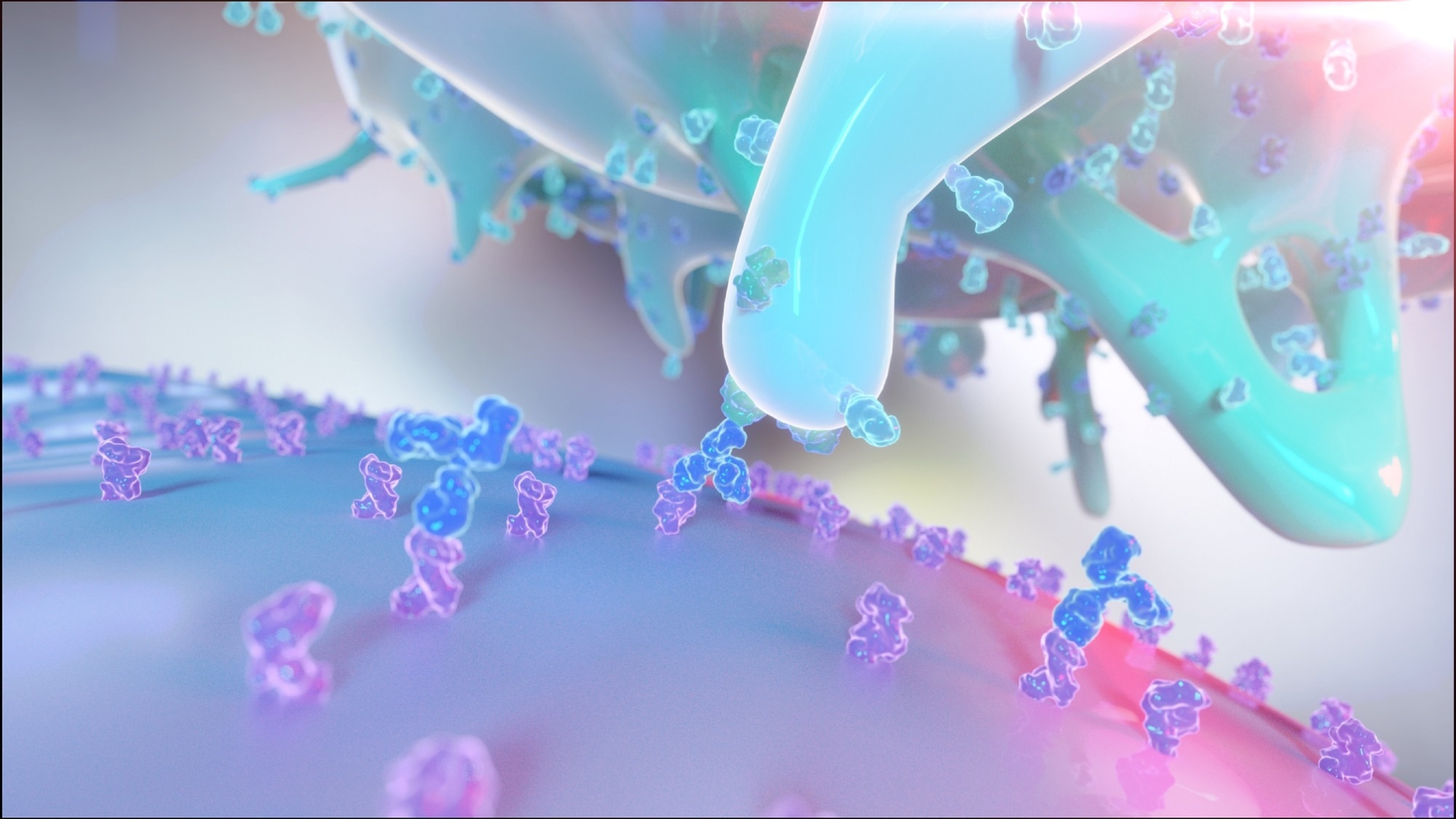In this omg OMx podcast episode, Bruker's Kate Stumpo gets inside the mind of an immunopeptidomics trailblazer, Nicola Ternette, to discuss how her work has helped to shed light on the role of peptides in the immune system. Watch the full episode below, or read on to discover select highlights.
Nicola Ternette | omg OMx Podcast | Ep. 8
Where did your journey begin?
I first began my studies in Germany, focusing on physics and biochemistry. During my research, I became interested in virology and vaccine development. Specifically, I worked on developing a vaccine for respiratory syncytial virus. My research showed the limitations of traditional vaccine approaches and the need to modify genes for the proper production of viral surface proteins. This led me to Oxford, where I focused on antigen discovery and vaccine development.
At Oxford, I learned about mass spectrometry and its ability to comprehensively analyze protein samples. Collaborating with experts in HIV research, I investigated how infected cells are perceived by the immune system, which informed vaccine development and advanced our understanding of immunology.
Building on this expertise, I established my research group, specializing in profiling immune-relevant molecules in various diseases, with a particular focus on cancer. We aim to use this information to improve vaccine development strategies.
My academic and professional journey has revolved around understanding the immune response to viral infections and leveraging that knowledge to develop effective vaccines.
Could you please provide an overview of immunopeptidomics and its significance in the field of biological research?
Immunopeptidomics using mass spectrometry is a powerful tool for investigating several biological questions. Traditionally, protein extracts from cells are separated based on size using a matrix, and specific proteins are detected using antibodies. However, this approach has limitations in terms of the depth of analysis it can provide. It primarily allows us to determine the presence or absence of specific proteins, such as APRT protein.
In contrast, mass spectrometry revolutionizes protein analysis by offering a broader range of tools. With mass spectrometry, even a small portion of the protein matrix can be analyzed, leading to the identification of numerous proteins in the sample. This newfound capability enables easy comparison between infected and non-infected cells, facilitating the understanding of the changes occurring during infection. Consequently, immunopeptidomics expands our understanding of protein dynamics and contributes significantly to the field of biological research.
 Image credit: Bruker Life Sciences Mass Spectrometry
Image credit: Bruker Life Sciences Mass Spectrometry
Do you remember that 'omg' moment that changed your world to make you want to build a career in science?
The study I conducted aimed to understand how the virus interacts with host cells, particularly regarding its visibility to the immune system and its evasion mechanisms. Our mechanistic approach focused on profiling specific antigens rather than vaccine development.
I did not have any single “omg” moment. Rather, I realized over time the potential of this information in identifying what the immune system recognizes in diseased cells, including cancer cells.
This led to collaborations with the industry to provide precise information for developing clinical therapies. These collaborations primarily focused on cancer treatment and resulted in partnerships to advance molecules into clinical trials. I find great excitement in contributing to the development of next-generation cancer therapies.
How did the pandemic influence your research (for better or worse) with the newly focused attention on viruses and vaccines?
The pandemic has influenced my research by highlighting the impact and effectiveness of vaccines in disease prevention. The global vaccination efforts have demonstrated the safety and efficacy of vaccines, which is relevant to the development of tumor vaccines.
The widespread vaccination campaigns have instilled confidence in the scientific community and the general population regarding vaccine effectiveness in protecting against infections. In the field of cancer research, we anticipate seeing the impact of vaccines as numerous clinical trials are underway.
Additionally, there have been positive developments in streamlining the regulatory processes for the clinical application of vaccines, allowing for a shorter timeline for translation into clinical practice. This presents significant opportunities for advancing our understanding and utilization of vaccines.
 Image credit: Shutterstock/Alpha Tauri 3D Graphics
Image credit: Shutterstock/Alpha Tauri 3D Graphics
Immunopeptidomics is a booming field at the moment. What do you hope to see in the next 10-15 years?
In the next 10-15 years, we anticipate significant developments and advancements in immunopeptidomics. There is optimism that immunopeptidomics and mass spectrometry will play a major role in the development of next-generation immunotherapies, particularly for cancer treatment.
Ongoing studies based on mass spectrometry results are expected to provide clinical evidence of its effectiveness within ten years. The identification of targetable antigens using mass spectrometry may progress more slowly but is a topic of discussion within the scientific community. Collaborative efforts aim to enhance our understanding of cancer-associated proteins and improve their annotation.
Overall, the next 10-15 years hold exciting prospects for clinical targeting in immunopeptidomics, although there is still much to be discovered and understood in this field.
About the speaker

Dr. Nicola Ternette is a leading expert in the field of immunopeptidomics. She received her Diploma and PhD in Biochemistry from the University of Bochum in Germany. She is a recipient of the Ruth and Gert Massenberg-Foundation Prize for graduating top of her class, and she received fellowships from the DAAD and DFG to pursue her postdoctoral work at Oxford University, where she is now an Associate Professor. Her work has been published in leading scientific journals. Dr. Ternette is passionate about using mass spectrometry to advance our understanding of the immune system. She is a frequent speaker at scientific conferences, and she is committed to training the next generation of scientists in the use of this powerful technology.

omg OMx host: Kate Stumpo, Senior Market Manager at Bruker
LinkedIn
About Bruker Life Sciences Mass Spectrometry
Discover new ways to apply mass spectrometry to today’s most pressing analytical challenges. Innovations such as Trapped Ion Mobility (TIMS), smartbeam and scanning lasers for MALDI-MS Imaging that deliver true pixel fidelity, and eXtreme Resolution FTMS (XR) technology capable to reveal Isotopic Fine Structure (IFS) signatures are pushing scientific exploration to new heights. Bruker's mass spectrometry solutions enable scientists to make breakthrough discoveries and gain deeper insights.